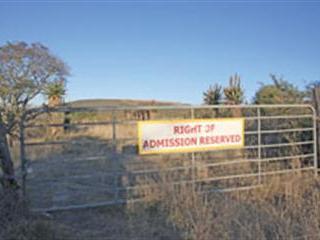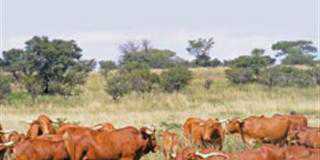
Debates about the motives behind farm violence haven’t changed much since the minister of police’s special commission of inquiry found that robbery was the motive in 89% of case studies. Many organisations don’t accept those findings.
Nor do they agree with President Zuma’s recent comments that farm murders should not be viewed as distinct from any other violent crime. The following were questions asked during the Redi Thlabi Show on Talk Radio 702.
Human Rights Watch has objected to the term ‘farm attack’, which it says denotes a para-military or terrorist objective. What’s your comment on that?
Ruth Hall (RH): There’s an inconsistent use of terms such as ‘farm murders’ and ‘farm attacks’. The definition of ‘farm attacks’ in the 2003 police minister’s commission of inquiry into farm attacks excluded any violence among farmers and farm workers.
In other words, it focused only on farm attacks organised by people not from the farm, and this is really one of the big disputes, because so much violence happens within the rural community. Which types of violence and attacks should be included or excluded? There isn’t consistency on this issue.
Is there a need for a definition for this, or is the president right in saying that farm murders should be viewed within the context of the country’s high crime statistics?
RH: I think he’s right. A lot of data has been collected about violence on commercial farms and violence in rural areas in general. Of all the data collected, robbery seems to be the overriding motivation for attacks on farm owners and farm workers by people not from the farms.
If I can just give you a sense of some of the data that we do have: between 1991 and 2001, which is the period for which we have the best data, there were 6 122 attacks in which 1 254 people were killed. Clearly a lot of violence is going on, but of all the attacks where it’s possible to define primary motive, it was robbery in 89% of the cases. There doesn’t seem to be very convincing proof that these attacks were racially motivated.
Are we in a better place than we were pre-1994?
RH: What seemed to have happened is that, from the early 1990s, ‘attacks’ seem to have risen very dramatically. They dipped a bit in 1997/1998 and rose again, and there was another spike in 2001. Because it was also the time of large-scale land occupations in Zimbabwe, it was at that point that Freedom Front Plus and TAU said: “This looks like a conspiracy to drive white farmers off the land”.
And there are certainly those who still see it that way. However, only 2% of the investigations canvassed for the police minister’s report could be defined as racially motivated. We also know that, in 65% of the cases, nobody was injured; and only in 35%, was violence associated with the attacks.
All of this is subject to dispute, and all I really can say is that, in a sense, this is an issue that holds up a mirror to our society. We all see different aspects of the story. My view is that the insistence that we only look at attacks perpetrated by people not from the farms is a mistake, because we need to understand how conditions on commercial farms make this phenomenon possible.
In 2011, Genocide Watch placed South Africa on level 6 (‘preparation’) of its eight stages of genocide, saying it has “evidence of organised incitement to violence against white people”. What should we read into this?
RH: Genocide is a very strong word to use here. Any murder is appalling and clearly there are high levels of violent crime in rural areas, but ‘genocide’ suggests targeting, and I have not seen evidence of this. It certainly didn’t come out in the police minister’s report or the 2003 Human Rights Watch report on farm violence.
I think there’s a lot of emotion around this issue. What we do know is that 12% of people being attacked on commercial farms are raped. Of these, 71% are black women, so I think we have to step away from this idea that farm murders are all attacks on white farm owners by black outsiders – the racial and gender dimensions are much more complicated. There’s a lot of violence on commercial farms between farm workers and farm owners and vice versa. Anyone who wants to understand the violence and abuse that people are exposed to needs to put it in that wider context.
The Human Rights Commission has pointed to weak levels of policing in rural areas as a major factor in rural crime. One response to this in the past has been to rely on para-military forces like farm commandos and private farm watches, but there’s also evidence that they are themselves major perpetrators of violence. It all comes down to complicated questions such as: “Who has the right to be on a farm?” If you’re visiting family members, are you a visitor or a land invader, or are you a squatter?
I believe one of the big problems is we think of commercial farms as somehow outside public space, because they’re privately owned. Yet there are also large communities that live on the farm, and this is another dimension of the dispute. Who has the right to be there? Who polices the space? On whose authority?
Let’s hear from Kallie Kriel, the CEO of Afriforum. Do you think farm murders are a specific and unique crime, and not what President Jacob Zuma described as crimes that happen in the broader context of the country’s high crime stats?
Kallie Kriel (KK): If you look at the stats we definitely have to place a specific focus on farm attacks because these are disproportionate to other crimes in the country. It’s more dangerous to be a farmer than it is to be a police officer. We’re not saying it’s more important than other crime, but there’s a precedent for according certain crimes a special focus. There’s a specific problem of crime against women and children, for example, and that’s why we have campaigns focusing specifically on that.
Let’s talk about the specific reasons for farm attacks.
KK: Our position is that one should be careful of making sweeping statements. In our debates people either say all attacks are racially motivated, or that race doesn’t play a role at all. But I think we’ve got a combination of reasons, and we need to address all of them. I think the fact that farms are isolated is definitely one. When the police still held statistics on farm murders, until 2003, only 2% of farm attacks were related to labourers on farms, so 98% of perpetrators were coming from outside.
If you look at some of these attacks, the torture that’s involved, there’s definitely a displaced form of hatred, and that’s why we’re saying we believe it’s inappropriate for former ANC Youth League president Julius Malema to make certain statements, because we already have this problem of racial tension.
What do you want to see happening?
KK: I think we need to unite South Africa against any form of violence and also violence on farms. A good start would be for people to make sure that, when they speak, they don’t make polarising statements that aggravate the situation. Secondly, we need to build the economy, so that people aren’t destitute, and we don’t have these kinds of occurrences. Thirdly, we believe police should prioritise safety in our rural areas so that criminals don’t think they can get away with violence and murder.
Your thoughts, Ruth?
RH: I find it fascinating that the conversation keeps returning to farmers, as if they’re being attacked and murdered in isolation. Clearly, there’s a lot of violence happening on farms, much of it inflicted within the farming communities, not only by outsiders. I think we should talk about violence in farming communities as opposed to attacks on farmers – then we’ll get a better picture of this phenomenon.
Transcribed and adapted from the Redi Thlabi Show on Talk Radio 702. – Sean Christie
Afriforum CEO Kallie Kriel will be expanding on his views in our next issue.













